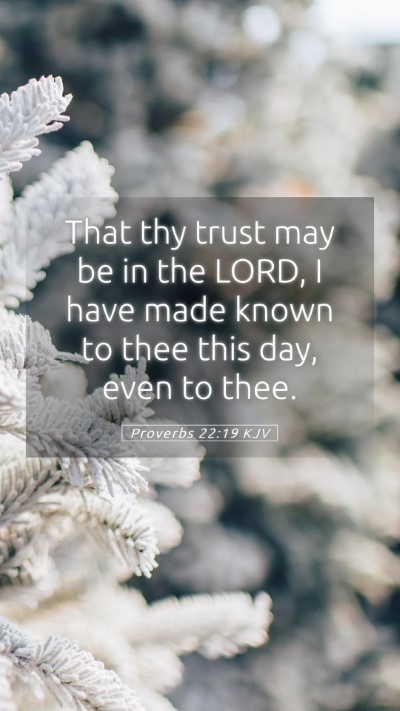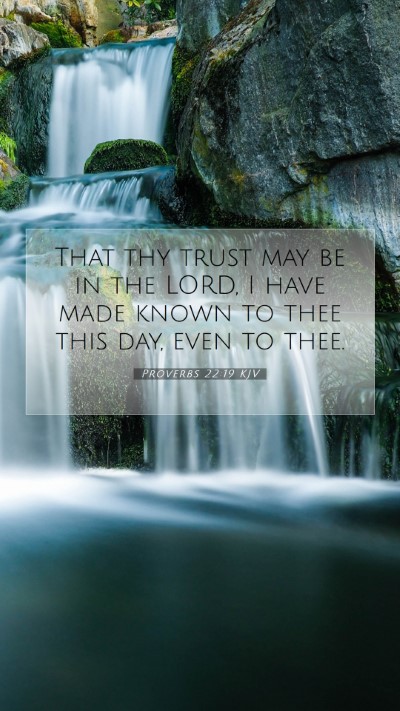Understanding Proverbs 22:19
Proverbs 22:19 states:
"That thy trust may be in the LORD, I have made known to thee this day, even to thee." (KJV)
This verse encapsulates a fundamental theme within the Book of Proverbs: the importance of placing one's trust in God. Here, we delve into the insights of public domain commentaries to provide a comprehensive understanding of this verse.
Bible Verse Meanings and Interpretations
The verse emphasizes that the purpose of imparting wisdom is to instill trust in the Lord. Each commentator reflects on the necessity of trusting God as a foundational element in the believer's life.
- Matthew Henry's Commentary:
Henry suggests that the declaration made here serves to remind us that divine revelation is meant to bring us closer to God. The exhortation to trust in the Lord signifies an invitation into a deeper relationship with Him, built through understanding His ways and commands. It encourages believers to rely on God's guidance as they navigate life.
- Albert Barnes' Commentary:
Barnes highlights the connection between knowledge and trust. He points out that knowledge of God's will leads to a trust that is not blind but is informed by experience and understanding. This trust is foundational for righteous living and assures believers of God's presence and assistance in their lives.
- Adam Clarke's Commentary:
Clarke underscores the emphasis on the personal and communal aspect of faith. He interprets the verse as a call to share God's truths, not just for personal edification but for the encouragement of others, fostering a community rooted in faithfulness to God.
Bible Verse Understanding and Explanations
Understanding Proverbs 22:19 requires us to consider the broader context of the Proverbs as a collection of wise sayings intended to guide moral living. The significance of the verse can be seen through the following interpretations:
- Trust as a Theme:
Throughout Scripture, trusting God is a recurring theme. The verse both encourages and reinforces the notion that one's faith should be actively placed in the Lord, which aligns with other scriptures like Proverbs 3:5-6, which urges believers to trust in the Lord with all their heart.
- Wisdom as a Tool:
The knowledge and understanding imparted through the Proverbs are intended to enhance one's life and decisions, ultimately leading to a reliant and faithful heart aligned with God's will.
- Relationship Building:
This verse emphasizes maintaining a relationship with God, where trust is built upon the revelation of His word. It shows that understanding Scripture is vital to developing a robust trust in the Lord.
Scripture Analysis and Biblical Exegesis
In conducting an in-depth Bible verse analysis, it's pertinent to explore the historical and cultural context of the time when Proverbs was authored. The wisdom literature reflects the understanding of life in ancient Israel, where trust in Yahweh was paramount for societal and individual survival.
Interpreting this verse includes recognizing the collective wisdom imparted to the community, shedding light on the importance of societal trust in divine providence and moral order.
Application of Bible Verses to Daily Life
The modern application of Proverbs 22:19 can be seen in several areas of life:
- Daily Trust in God:
Encouraging believers to incorporate an active trust in God’s path as they face daily challenges.
- Sharing Wisdom:
Believers are called to share their revelations and experiences with others, fostering trust within community settings such as Bible study groups.
- Faith in Actions:
This verse emphasizes that faith is not merely an internal belief but should manifest in actions reflecting trust in God’s word.
Cross References
Related scriptures that complement the message of Proverbs 22:19 include:
- Proverbs 3:5-6 - Trust in the Lord with all your heart, and lean not on your own understanding.
- Psalm 37:5 - Commit your way to the Lord; trust in him, and he will act.
- Isaiah 26:4 - Trust in the Lord forever, for the Lord God is an everlasting rock.
Conclusion
Proverbs 22:19 serves as a profound reminder of the importance of trust in God cultivated through knowledge and understanding of His word, which is rooted in personal relationship and communal support. Engaging with public domain commentaries such as those by Matthew Henry, Albert Barnes, and Adam Clarke provides deeper insights into the verse's significance, paving the way for informed Bible study and personal application.


